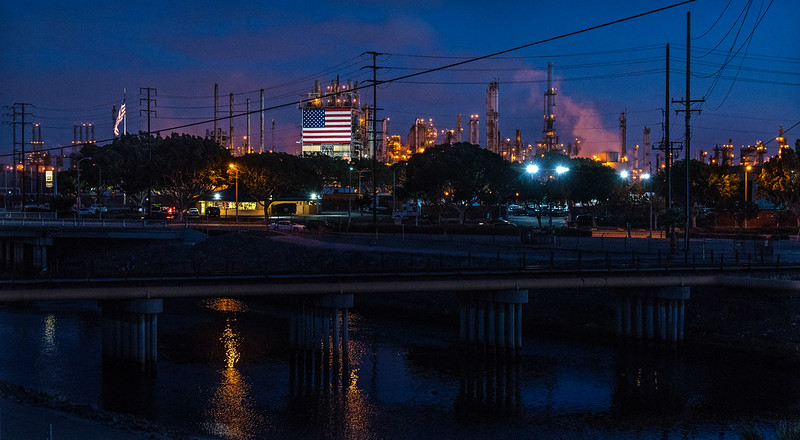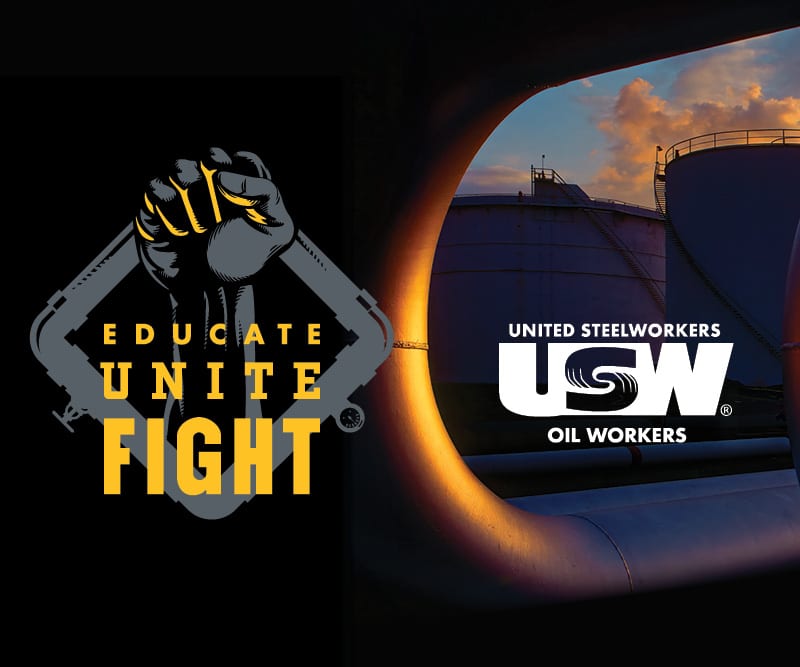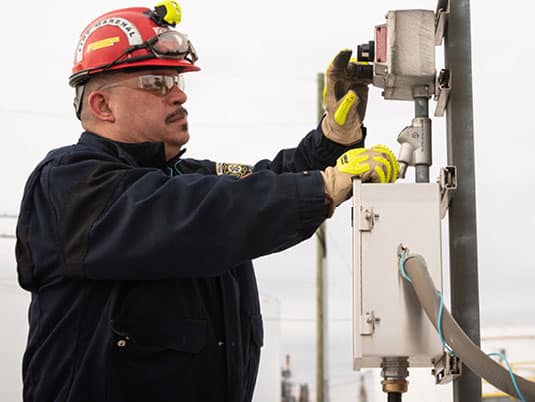Oil Workers Set Bargaining Goals for 2019 Negotiations
At the end of September, more than 375 oil delegates to the National Oil Bargaining Program (NOBP) conference developed their national bargaining goals and passed the NOBP oil policy. They represented refineries, petrochemical plants, terminals and pipelines.
Bargaining for a national pattern agreement starts in January 2019.
The NOBP Oil Policy covers wages, benefits and working conditions like health and safety.
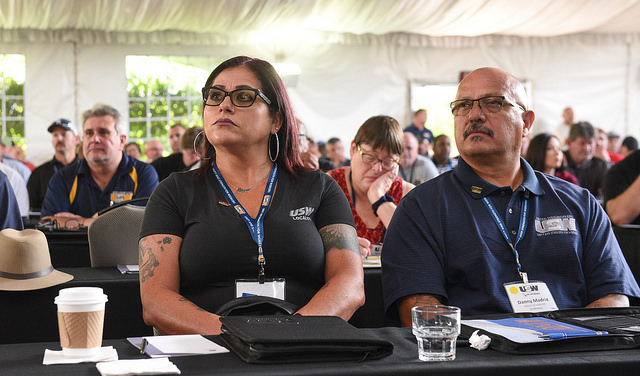
Since the Sept. 23-26 conference, held in San Diego, the delegates have been presenting the oil policy (national bargaining proposals) to their oil locals/units for a vote at their membership meetings. They also are voting on giving strike authority to the two lead bargainers— Kim Nibarger, head of USW’s National Oil Bargaining Program, and USW International Vice President Tom Conway.
The locals and units have 45 days from the end of the NOBP conference to complete this process, which ends in mid-November. The oil policy is considered ratified once 75 percent of the oil locals/units ratify it.
Bargaining at the national and local levels occurs in January before the national pattern agreement and local contracts expire on Feb. 1 at 12:01 a.m.
Shell Oil Company is once again the lead company in the national talks. It communicates and coordinates with the rest of the oil companies through an industry-wide organization called Organizational Resources Counselors (ORC).
All of the oil companies cannot sit down at the same bargaining table because of federal anti-trust legislation.
Council Coordination During Bargaining
Local issues, such as bidding rights and work rules, are bargained at local union tables. However, Nibarger has been getting locals to coordinate their bargaining with other locals in their company councils.
“We operate through our company councils, and they are united in their contract proposals to the company,” he said. “When a company proposes a change at one location, you need to get on the phone to the rest of the council to let them know a change has been proposed and coordinate your efforts.”
Creating the Policy
The oil policy is derived from the rank-and-file. Prior to the NOBP conference, oil locals and units usually pass out bargaining surveys to gauge what issues are important to the membership.
This information helps conference delegates discuss bargaining issues in their company councils. Delegates met during the NOBP conference for two days in 17 company councils to discuss bargaining issues and give local union reports.
They reconvened in a general session to report the proposals each council wanted addressed. The elected rank-and-file Oil Policy Committee—it consists of five members and five alternates from five NOBP regions across the U.S.—took all of the council proposals and created a proposed oil policy for the delegates to vote on the next day.
It is an intense process to create one oil policy from bargaining proposals submitted by 17 councils. Oil Policy Committee members vetted each proposal in a meeting with Kim Nibarger for almost 20 hours.
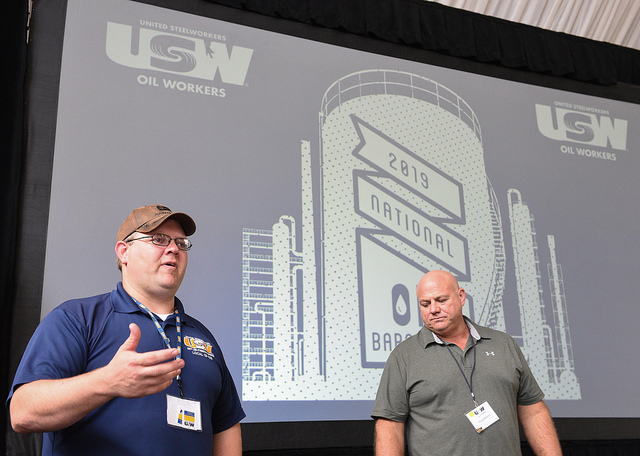
The next morning the committee presented the oil policy to all the delegates in a general session. Delegates lined up at two microphones to suggest changes and express concerns. The committee returned a little over an hour later with a revised oil policy, which the delegates approved.
NOBP Policy
The NOBP Policy follows up with some of the contract proposals in the last round of bargaining in 2015, Nibarger said. He told the media that a three-year contract is proposed, and said that worker safety will be an issue.
“These are dangerous jobs. People understand they are not safe and are managing a risk. We want to participate with the companies in helping them manage those risks,” Nibarger said.
He told the media that worker fatigue continues to be a work in progress, but the union has had success in some locations because the companies hired more employees.
He said there also has been some success in reducing the contracting out of daily maintenance work.
“It is an ongoing process, but I think we’ve gotten more members back in the workforce,” Nibarger said. “It is more productive for companies because they have a workforce that has some stake in what they do. In the places where we are able to increase those numbers, if you talk to those companies, they are quite happy with the results.”
Election for Alternates
During the conference, delegates from NOBP Region E (District 13) elected Bryan Gross, a Local 13-423 member, to be an alternate to the NOBP Oil Policy Committee. He works at the Total Petrochemicals refinery in Port Neches, Texas.
Kevin Herbein was elected to be an alternate for NOBP Region B (Districts 4, 10, 8 and 9). He is the Local 4-898 president and works at the PBF refinery in Delaware City, Del.
Mobilizing for Power
Oil Policy Committee members are beginning the conference calls with oil locals/units in their regions to coordinate mobilization activities. Stickers will be delivered to each local/unit. Closer to negotiations there will be other solidarity actions for all members to participate in.
If they have not already done so, oil locals/units are setting up their Communication and Action Teams (CAT).
At the NOBP conference, many of those attending had not been through a round of National Oil Bargaining or only experienced one round of it.
“Make sure new members understand why the oil bargaining program is important, why it is important to have solidarity, and why we have the NOBP program,” said USW Strategic Campaigns Director Melinda Newhouse.
Members can receive bargaining updates via text messages. Text OIL to 47486. You will be asked what company you work for. Soon, the USW will have the capability to send text messages on issues pertaining to a specific USW company council.
The OilWorker is now available electronically. To receive it, sign up at usw.to/Oilworker.
More Photos from the Conference
By clicking Sign Up you're confirming that you agree with our Terms and Conditions.
Recent News Articles
Want to Learn More?
See how the USW is making a real difference in our communities and our workplaces.
